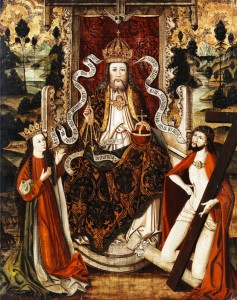 The Liturgy prayed today in the Ordinary Form of the Mass is that of Solemnity of Christ the King. (The Extraordinary Form offered this Mass on the last Sunday of October.) How is it that Catholics and Americans speak of Christ as King? The secular analogue of kingship in the USA does not exist for us. Yet, we are often fascinated by the activities of the British royal family and we often raise some political families to the rank of minor royalty.
The Liturgy prayed today in the Ordinary Form of the Mass is that of Solemnity of Christ the King. (The Extraordinary Form offered this Mass on the last Sunday of October.) How is it that Catholics and Americans speak of Christ as King? The secular analogue of kingship in the USA does not exist for us. Yet, we are often fascinated by the activities of the British royal family and we often raise some political families to the rank of minor royalty.
For the Christian, our King is the Incarnate and Eternal Word of God who lived in history, not in a palace but in a humble setting. Jesus lived and work among the people; He taught forgiveness, justice, love, a life centered on God, modeled the work of building up His Father’s kingdom, exhorted us to be Eucharist for the Life of the Church, and He suffered, died on a cross, resurrected from the dead and ascended to life in the Trinity. The sole mission of Jesus was to show us the face of God the Father, that is, to bring us into communio with the Trinity. How is this possible? The feast of Christ the King ought to draw our attention and concrete activity to the sacraments of initiation whereby we are given our dignity as children of God; where we share by adoption where the Trinity lives by nature. From the the sacramental life of the Church we live.
I am reminded of our Catholic theology of Baptism we are given “The anointing with sacred chrism, perfumed oil consecrated by the bishop, signifies the gift of the Holy Spirit to the newly baptized, who has become a Christian, that is, one “anointed” by the Holy Spirit, incorporated into Christ who is anointed priest, prophet, and king” (CCC 1241).
And, “The baptized have become “living stones” to be “built into a spiritual house, to be a holy priesthood.” By Baptism they share in the priesthood of Christ, in his prophetic and royal mission. They are “a chosen race, a royal priesthood, a holy nation, God’s own people, that [they] may declare the wonderful deeds of him who called [them] out of darkness into his marvelous light.” Baptism gives a share in the common priesthood of all believers” (CCC 1268).
How is the royal mission and holy priesthood exercised? By living in grace; by living the Gospel, by attending to our conversion; by living the corporal and spiritual works of mercy. By personally being engaged in the building up of the kingdom of God where we live: among family, friends, coworkers, in study, in prayer, and in work. This requires awareness. How awake are we in noticing the poor and those in genuine human need?
Yet, for this method to be effective, I think we have to ask ourselves, what and who is sovereign in our lives? Sometimes, sin and dysfunction distract us.
Norbertine Father Andrew Ciferni of St Norbert Abbey and College preached this point today,
We celebrate this day with great solemnity. In some ways we mimic the rituals of the throne room. But the Scriptures will not let us rest too comfortably in solemn gesture and big sound – appropriate as they may be. The gospel we proclaim is that of the king whose throne is the tree of the Cross, a seat of forgiveness for the sinner. And what makes this king different from all others is that he enthrones and crowns all his subjects with him. We are a royal people. On the day of our baptism we are anointed as kings, priests and prophets. This means that sooner or later it will be revealed to us that we too reign from the Cross. That like King Jesus we can only bring reconciliation can only make peace in and through our own blood. As we read in the Letter to the Hebrews (9:22), “without blood there is no forgiveness.”